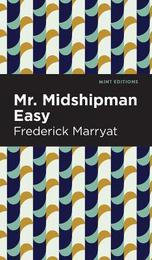
|
Mr. Midshipman Easy
Hardback
Main Details
Description
Mr. Midshipman Easy (1836) is a novel by Frederick Marryat. Inspired by the author's experience as a captain in the Royal Navy, Mr. Midshipman Easy is a tale of bravery, foolishness, and the manifold reasons for men to take to the high seas. Frequently funny, often profound, Marryat's novel is an underappreciated classic of nineteenth century fiction that has been adapted twice for British cinema. "'Then, father, all I have to say is, that I swear by the rights of man I will not go back to school, and that I will go to sea. Who and what is to prevent me? Was not I born my own master?-has any one a right to dictate to me as if I were not his equal? Have I not as much right to my share of the sea as any other mortal? I stand upon perfect equality,' continued Jack, stamping his right foot on the floor." Fueled by his father's philosophical ideas on liberty and equality, Jack Easy decides he will prove himself in a place where all men are equals. Despite his bravery, he soon finds that ideals will get one nowhere in the service of the Royal Navy. Working below deck with the African cook Mephistopheles Faust, Jack learns the secrets of the ship and encounters a lesson in discipline he will never forget. As he rises through the ranks and makes a name for himself during the fierce fighting of the Napoleonic Wars, Jack discovers new depths to his fortitude that would never have showed themselves had he stayed on land. With a beautifully designed cover and professionally typeset manuscript, this edition of Frederick Marryat's Mr. Midshipman Easy is a classic of British literature reimagined for modern readers.
Author Biography
Frederick Marryat (1792-1848) was an English naval officer and novelist. Born in London, Marryat was raised in a prominent merchant family by Joseph Marryat, a member of Parliament, and his American wife Charlotte. He joined the Royal Navy in 1806 as a midshipman on the HMS Imperieuse, serving under Lord Cochrane. Throughout his naval career, he served on several ships and was present at battles against the French fleet off the coast of Spain. On the HMS Spartan, he fought in the War of 1812 and participated in raids on New England. After the war, he worked as an inventor and artist, patenting a new lifeboat and making a famous sketch of Napoleon on his deathbed in Saint Helena. He retired from the Royal Navy in 1830 to pursue a career as a professional writer, producing nautical novels and finding success with Mr. Midshipman Easy (1836). He frequently based his stories on his own experiences and earned a reputation as a member of Charles Dickens' influential literary circle. His novels of adventure on the high seas would inspire countless storytellers, including Mark Twain, Ernest Hemingway, and Joseph Conrad.
|